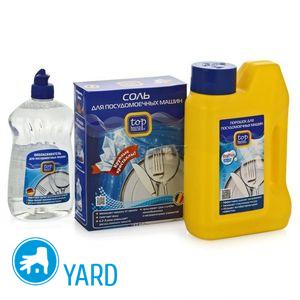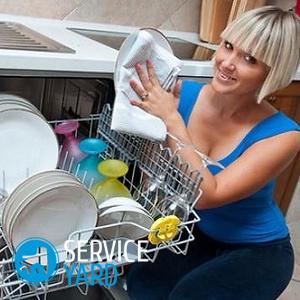Dishwasher cleaning 🥝 citric acid limescale remover

Many of us believe that a dishwasher can wash itself, because the main function of this machine is to wash. So - if the plates become clean, then the dishwasher will be clean too, and the question of how to clean the dishwasher at home should not arise at all. But not so simple. Unfortunately, small debris, scraps, fat accumulate over time and degrade the performance of the dishwasher. In addition, the car may smell as if from a garbage collector, so this equipment also needs specific care, the rules of which you will learn from this article.
to contents ↑How to operate the dishwasher?
To prevent the problem of how to clean the dishwasher as little as possible, use it often and systematically. Is it strange? But this is a fact.
to contents ↑Important! Paradoxically, the less often you use the equipment, the less will be its service life. It is not permissible to use the dishwasher 1-2 times a month to save on electricity, water and detergents. The dishwasher must operate at least once every 2 days to prevent long-term accumulation of food debris.
Basic care rules
When operating this appliance, follow these guidelines:
- To keep the dishwasher long, check the water inlet hoses more often. If necessary, clean them with a toothpick.
- Dry the rubber gasket in the door once every 2 months.
- Be sure to clean the dishes before washing from food debris. Try not to overload the machine.
- To make dishes sparkle clean, choose the right dishwasher cleaner. Check that the glitter and salt nests are well filled.
Important! If you still can’t figure out the types and manufacturers on your own, our dishwasher rating.
- Periodically turn on the empty washing machine by adding 1 liter of hot vinegar to the hot water. This method will help to clean the drain. After the procedure, be sure to dry the machine and leave the door ajar to remove the smell of vinegar.
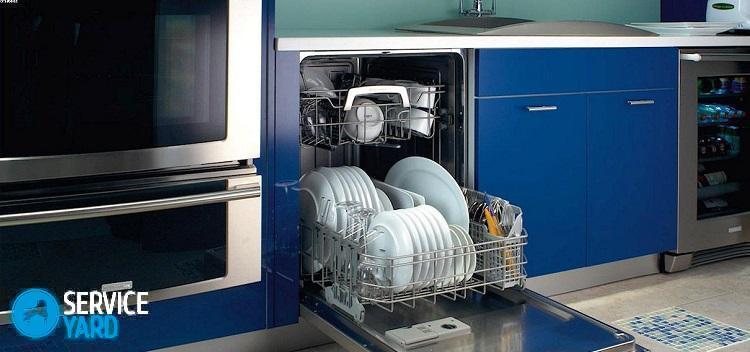
Additional Dishwasher Recommendations
To clean the dishwasher was easy and not out of order, please note that the following dishes cannot be washed in it:
- cutlery made of wood (partially or completely), as they lose their presentation, and the glue used in the manufacture of such dishes does not withstand high temperatures;
- decorative glass products that are very sensitive to external influences;
- rare porcelain or antique dishes of special manufacture;
- disposable plastic utensils;
- crystal with lead particles;
- products made of synthetic materials that are sensitive to high temperatures;
- copper and tin dishes;
- stainless steel items;
- handicrafts;
- old dishes whose coating is not heat-resistant;
- items with silver and gold inserts, as washing may change color and dishes will fade.
Important! Also, in no case should you wash towels, sponges, napkins.
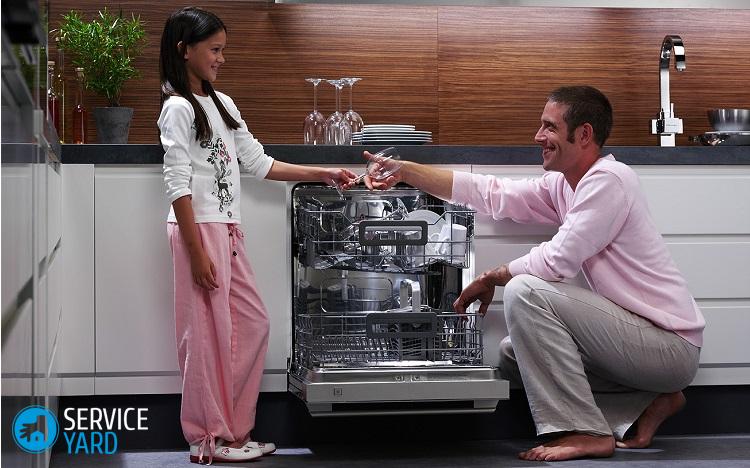
How to increase the efficiency of the dishwasher?
To ensure that all dishes are perfectly clean after washing, the dishwasher detergent is well dissolved and rinsed, follow these rules:
- Place the dishes in the machine face down and inward.
- Before turning on the machine, check if the carousels can rotate.
- Do not place the dishes too tightly, as the dishwasher washes them by spraying with water, which means that water should freely enter the plates.
- Wash small objects with forks and knives so that they do not slip to the bottom.
- Do not wash containers with labels, as they may come off.
- Do not get carried away with a preliminary rinse.
- If something falls to the bottom of the dishwasher, immediately raise the fallen object.
- To avoid stains on the dishes, use a rinse once a month: unscrew the round lid on the door and pour the product where indicated in the instructions.
Important! Do not use rinse aid if you use a water softener.
Find out more about how all these and other rules affect the efficiency of the equipment, in particulardishwasher flow rate.
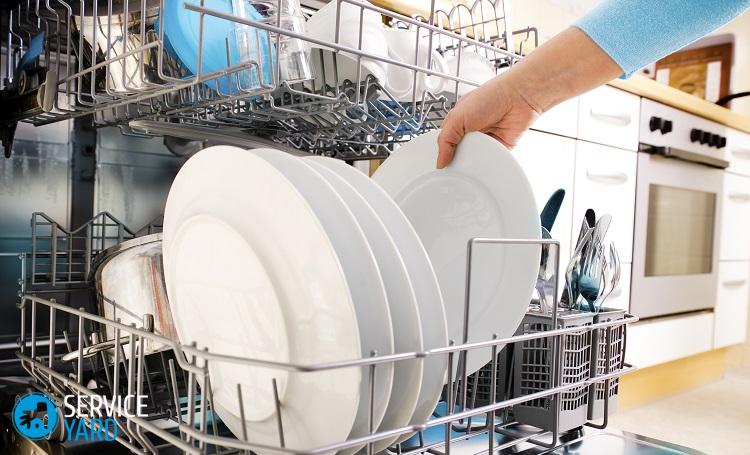
How to clean the dishwasher?
Cleaning the dishwasher at home is easy. To do this, it’s not even necessary to call the wizard if you follow this instruction:
- Turn off the power.
- Check the holes through which water passes into the wash chamber:
- If you find contamination that interferes with the free flow of water, carefully use a pair of tweezers to remove it (do not push it inside).
- If the hole is small and it is not possible to remove the dirt with tweezers, then take the wire and push the blockage through it.
- Start cleaning the ends of the door. At the junction of the door and the body, dirt usually accumulates, which subsequently decays and gives off an unpleasant odor. Clean the door with detergent and a sponge. Clean stubborn dirt with an old toothbrush.
- Wash instrument baskets thoroughly by hand.
- Clean the filter and grille through which water flows into the sewer. In new dishwashers, the filter is easily removed, but if you are the owner of an old model, you will have to unscrew the filter.
Important! Following our instructions step by step, you clean the dishwasher from grease, food debris and dirt, but you won’t get rid of scale in this way, and this is a real enemy for any household appliances.
If your equipment also began to produce various error codes and does not start or works intermittently, you need to solve this problem. And you can do without a wizard at the initial stage - for this, use our instructions to help implementdo-it-yourself dishwasher repair.
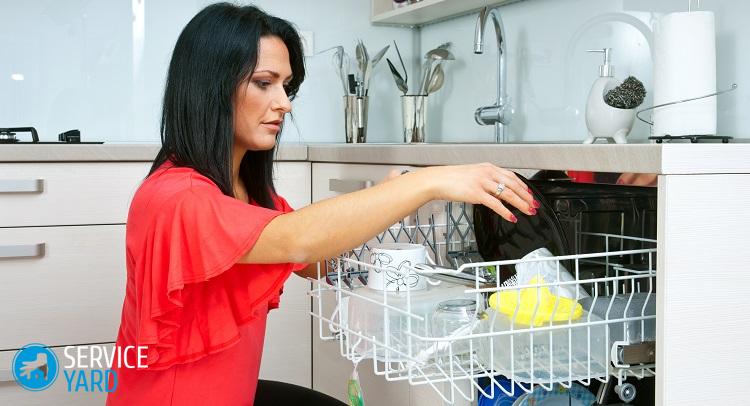
How to descale your dishwasher?
During operation, scale accumulates, which degrades the quality of the sink and at the same time makes the dishwasher work more intensively. Scale accumulates on the heating elements, so they have to work longer to heat the water to the desired temperature, which means they will have to consume more electricity.
Important! Use a mild acid solution to remove scale. The market has provided many such products for dishwashers. It can be a powder or a solution. Many consumers use folk remedies that dissolve scale well. For example, citric acid, vinegar.
Method 1
To clean the machine from scale, carry out 1 washing cycle without dishes using a special descaler for dishwashers.
Method 2
For vinegar cleaning:
- Pour 2 cups of the product into the bottom of the basket.
- Turn on the machine to heat the water.
- Stop the car in the middle of the cycle and leave it for 20-30 minutes (it can be done at night).
- Complete the wash cycle.
Method 3
Citric acid is the most universal anti-scale remedy. This product can be found in almost any home. The amount of acid used depends on the amount of scale, on average 200-400 g are needed. Pour citric acid into the machine and carry out the usual washing process.
Important! When using citric acid to descale your dishwasher, beware of precautions. After using this product, repeat the washing process with absolutely clean water.
Method 4
For owners of expensive household appliances, in particular “Bosch” dishwashers, we recommend using “Anti-scale” for prevention against scale. You can buy it at any household chemistry store. Be sure to consult with specialists and read the instructions for using the tool.
Important! “Anti-scale” prevents the appearance of scale. It must be added during washing dishes. The only negative is that you do not need to use it often so that the chemical elements do not pass onto the dishes. Use the product only for preventive purposes.
In order not to waste money on the purchase of anti-scale products, when buying a dishwasher, ask if it has a anti-scale function and a water hardness regulator.
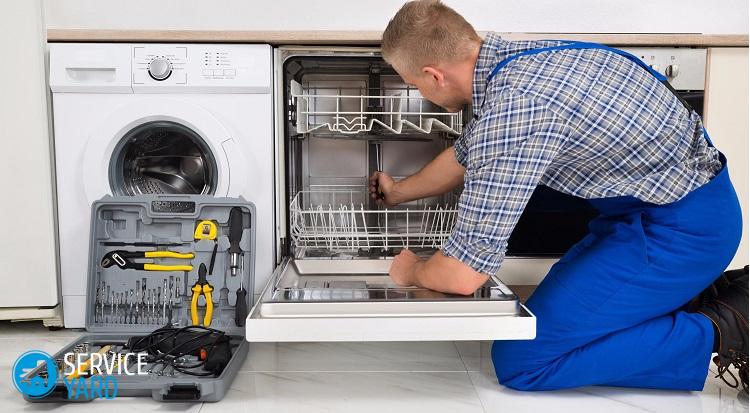
Dishwasher cleaner
In household chemical stores, it’s not very difficult to find a special dishwasher cleaner. But usually, any household appliances that come in contact with food are recommended to be cleaned with the same means as the dishes. For example:
- Fluid “Fairy”. Using a rag and a tool, carefully clean all the nooks and crannies of the device.
- “Fairy Platinum”. These pills are more convenient to use. Along with the powder, this product includes salts to soften water, as well as to remove rust and scale.
- “Finish.” Another company that produces special cleaners for dishwashers. This tool is enough to apply 1 time in 30 cycles in order to maintain excellent hygiene conditions. Finish is sold in a 250 ml bottle. Before use, remove the sticker and place the container in the grid for dishes (dishes should not be there). After that, start a normal duty cycle. This is a professional dishwasher cleaner.
Important! For the correct action of the cleaner:
- Place the bottle upside down.
- The temperature regime of the cycle should not be lower than 65 C.
In addition to the purchased means for dishwashers, also use home remedies, which are described below.
Vinegar and soda
The smell of freshness of the dishwasher can be returned using vinegar and soda:
- Place the filter in the dishwasher in soapy water for 10 minutes.
- After replacing the filter 1 tbsp. put vinegar to the bottom of the dishwasher.
- Run the device in full cycle mode.
- At the end of the cycle, lay baking soda on the bottom of the machine.
- Leave the equipment overnight.
- In the morning, turn on the machine in a full cycle.
Users of miracle technology offered a fantastic recipe from baking soda how to wash the machine inside:
- Mix 2 cups of soda with 3 tbsp. l hydrogen peroxide.
- Add 20 drops of essential oil.
- Mix all ingredients to a consistency resembling wet sand.
- Using an ice cream spatula, shape the balls.
- Before starting up the dishwasher, make sure that food debris is removed and the filter is cleaned.
- After the baking soda balls have hardened, place them on the bottom shelf of the machine.
- 2 tbsp. vinegar and 1 tbsp. l pour detergent into a plate. Place the cooked product on the top shelf.
- Launch the dishwasher.
Borax
Cleaning with this product is simple and affordable:
- Wash the bottom and doors from the inside of the machine with a sponge or a damp cloth.
- Treat the entire surface with plenty of borax.
- Start the wash cycle.
- At the end, rinse the borax with a damp cloth.
- To complete the cleaning, add ¼ cup of borax to the dishwasher compartment during the next cycle. After that, you can wash the dishes again.
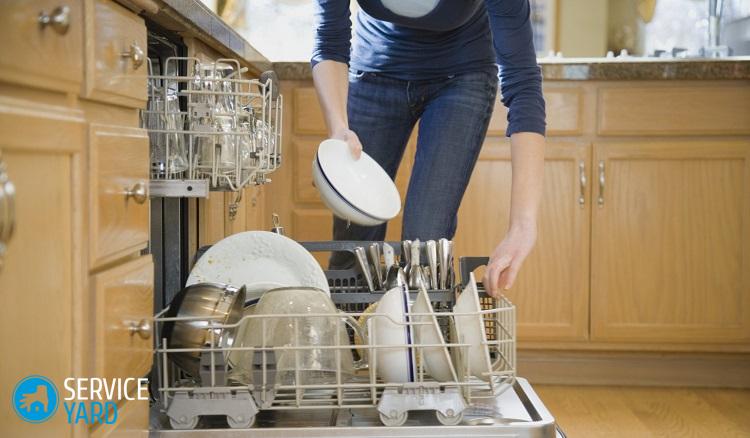
Bleach
Remember that bleach is harmful to stainless steel. Therefore, if the inside of your machine is made of this material, then use a different cleaning agent.
Or maybe it's just time to replace your kitchen appliances with new ones, if washing it is not possible? Then our detailed review will be useful to you, with the help of which you will accurately determine the suitable characteristics for yourself, understand what isthe best dishwasher for the householdwhich model to give preference.
to contents ↑Important! The advantage of cleaning the machine from grease with bleach is the fact that this is the surest way to remove mold. Therefore, if persistent mold spots appear, then fill the glass with bleach instead of detergent, then run the machine at a high temperature and there will be no trace of your problem.
Stock footage
Any household equipment makes our life easier and saves time, but it requires proper operation and daily care. It does not matter what brand your dishwasher, whether Bosch or electrolux, if you follow the simple rules and regularly service your assistant, then the dishwasher will serve you for many years.






